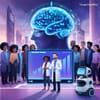Artificial intelligence (AI) literacy has become a critical skill in the modern workforce, transforming professional trajectories and redefining workplace expectations. AI literacy involves understanding and applying artificial intelligence to enhance productivity, accelerate innovation, and gain a competitive edge. It's about being able to navigate AI tools and integrate them meaningfully into work.
In today's fast-paced business environment, workers who are AI-literate have a decisive professional advantage. They can streamline workflows, anticipate trends, and make data-driven decisions, leading to increased employability and career advancement opportunities. AI literacy is no longer a niche skill, but a fundamental requirement for professionals looking to stay ahead in their careers.
Various industries are being impacted by AI, including marketing, project management, and education. In marketing, AI can help predict consumer behavior, optimize campaigns, and analyze engagement metrics. In project management, AI-powered tools can provide predictive analytics and workflow optimization. In education, AI can help educators tailor lessons, assess student progress, and suggest targeted interventions.
To be AI-literate, professionals need to develop key skills such as adaptability, creativity, strategic thinking, and critical thinking. They need to be open to learning new AI tools and technologies, use AI to explore new ideas and refine outputs, apply AI to drive innovation and solve problems, and develop ethical literacy to navigate AI-related issues responsibly.
As AI continues to merge with human judgment in the workplace, those who can navigate this intersection will be shaping the future of work. Embracing AI is no longer optional; it's essential for anyone seeking to remain relevant and competitive in an evolving professional landscape. By prioritizing AI literacy, professionals can unlock new opportunities, drive innovation, and stay ahead in their careers.


